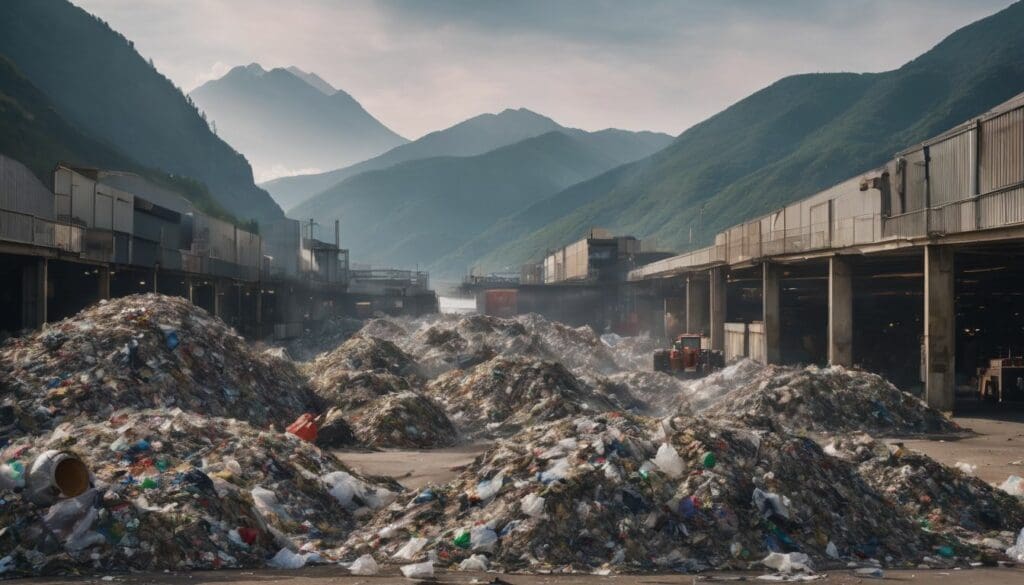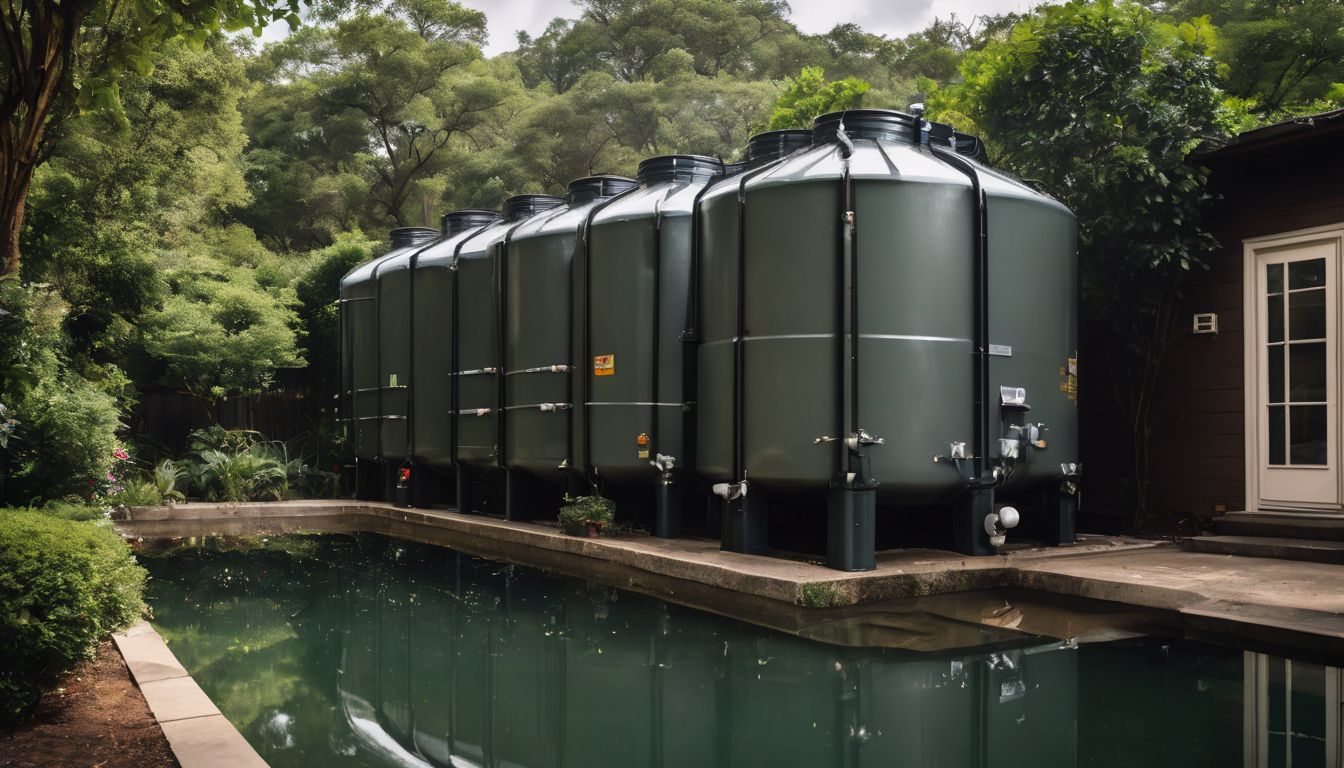Mountains of waste piling up in our communities present a pressing challenge. A single person generates about 1.2 kilograms of waste per day, impacting our environment and health significantly.
Our blog offers practical strategies that can be applied community-wide to reduce this growing problem effectively. Discover how together we can make a difference!
Key Takeaways
- Community – wide waste reduction is achievable by setting high diversion goals, adopting zero waste plans, and ensuring that everyone has access to efficient waste management services.
- Encouraging the reuse and donation of items can significantly reduce landfill waste, while backyard and neighbourhood composting helps manage organic waste effectively.
- Implementing Pay-as-you-throw (PAYT) systems alongside product fees and retailer take-back programmes offers economic incentives for consumers to minimise their environmental impact.
- Expanded municipal collection services ensure timely disposal of recyclables. Additionally, optimising kerbside collection through technology improves efficiency and reduces emissions.
- Education plays a critical role in community – wide waste reduction efforts. Involving residents in sustainable practices promotes mindful consumption and better recycling habits.
Understanding the Problem of Waste in Communities
Waste in communities has a significant impact on the environment, and it is essential for communities to take responsibility for waste management. Current waste reduction strategies are being implemented, but there is room for improvement.
The impact of waste on the environment
Every year, mountains of waste pile up in landfill sites, emitting greenhouse gases like methane, a potent contributor to climate change. These emissions directly affect air quality and contribute to global warming.
Not just the air suffers; waste leaks into soil and waterways, poisoning ecosystems and harming wildlife that mistake debris for food.
Plastic pollution is particularly destructive as it doesn’t break down quickly. It pollutes oceans, entangling marine animals and disrupting entire underwater communities. Industrial waste adds toxic chemicals into the environment which can lead to hazardous waste substitution.
With effective community-based management strategies and zero-waste initiatives, reducing this environmental burden is achievable while promoting a sustainable future through recycling programmes and composting efforts.
The role of communities in waste management
Communities play a crucial role in waste management by promoting recycling services and composting initiatives, which contribute to sustainable waste management. Encouraging community-based waste management fosters environmental conservation efforts and supports zero waste initiatives.
Implementing industrial waste reduction programmes at the local level enhances resource recovery efforts and builds a circular economy. By organising action plans for waste management, communities lead eco-friendly waste disposal methods and drive green living initiatives.
Municipalities need to involve the public in policy implementation for effective waste reduction planning, ensuring universal provision of recycling services while integrating goals across plans.
Current waste reduction strategies
Successful Case Studies of Community-Wide Waste Reduction
Community-wide waste reduction has been successfully implemented through high diversion goals, zero waste plans, and green procurement practices. These case studies demonstrate the effectiveness of integrating waste reduction goals across different plans and leading by example in the community.
Implementation of high diversion goals/plans
- Setting aggressive diversion targets: Establishing specific and measurable goals for diverting waste away from landfills.
- Introducing advanced recycling programmes: Implementing innovative recycling schemes to capture and recycle a wide range of materials, including plastics, glass, and paper.
- Promoting composting initiatives: Encouraging the composting of organic waste to reduce the volume of waste sent to landfills.
- Educating and engaging the community: Empowering residents with knowledge and skills to participate in diversion efforts through educational campaigns and community workshops.
Adoption of zero waste goals/plans
To achieve zero waste goals and plans in communities, it is essential to:
- Establish clear targets for waste reduction and diversion.
- Develop comprehensive action plans outlining steps to minimise waste generation.
- Engage community members in adopting sustainable waste management practices.
- Implement circular economy practices to minimise landfill-bound waste.
- Encourage eco – friendly waste disposal methods through education and incentives.
Integration of goals across plans
To ensure successful waste reduction, goals need to be integrated across various plans. This will help in aligning efforts and resources towards a common objective. In order to achieve this integration, the following steps can be taken:
- Establish clear communication channels and coordination mechanisms between different waste management initiatives.
- Align waste reduction goals with broader community sustainability targets, ensuring a holistic approach.
- Integrate waste reduction objectives into local development plans and policies for comprehensive implementation.
- Share best practices and lessons learnt among various stakeholders to foster collaboration and avoid duplication of efforts.
Lead by example through green procurement and road construction
Communities can lead by example in waste reduction efforts through green procurement practices and eco-friendly road construction. By prioritising the purchase of sustainable products and materials, communities can reduce their environmental impact and promote a circular economy.
Additionally, incorporating environmentally friendly practices into road construction, such as using recycled materials or implementing permeable pavements, contributes to overall waste reduction and minimises the ecological footprint of infrastructure projects.
Implementing green procurement practices involves sourcing goods and services that have minimal environmental impact throughout their life cycle. This includes considering factors such as energy efficiency, recyclability, and reduced packaging.
Solutions for Community-Wide Waste Reduction
Implementing mandatory recycling and composting, along with pay-as-you-throw systems, product fees, and retailer take-back programmes are effective strategies for reducing community-wide waste.
These solutions encourage responsible waste management practices and help communities move towards a more sustainable future.
Universal provision and access to waste management services
Communities must ensure universal provision and access to waste management services. This means that every individual should have equal opportunity to dispose of their waste responsibly, regardless of their location or circumstances.
Municipalities should implement collection services that reach all areas, ensuring no one is left without a sustainable option for getting rid of their waste.
The goal is to make it easy for everyone in the community to participate in proper waste disposal, thereby reducing the environmental impact of improper waste management practices.
Implementation of mandatory recycling and composting
To reduce waste in communities, implementing mandatory recycling and composting is crucial. This includes:
- Educating the community about the importance of separating recyclable materials from general waste to improve recycling rates and decrease landfill waste.
- Enforcing strict regulations to ensure that all households and businesses participate in recycling and composting programs, thereby reducing the amount of waste sent to landfills.
- Providing accessible collection points for recyclable materials and organic waste to encourage proper disposal practices.
- Collaborating with local authorities to create incentives for businesses and individuals who actively participate in recycling and composting efforts, rewarding eco-friendly behavior.
Pay-as-you-throw (PAYT) system
Transitioning from the mandatory recycling and composting strategies, the Pay-as-you-throw (PAYT) system offers a proactive approach to waste reduction. This pricing model charges households based on the amount of waste they produce, encouraging residents to minimise their trash output and increase recycling and composting efforts.
In this way, PAYT provides a direct economic incentive for individuals to reduce their waste, aligning with broader community-wide waste reduction goals.
By implementing the Pay-as-you-throw (PAYT) system, communities can effectively shift towards more sustainable waste management practices while also promoting individual responsibility for environmental impact.
Product fees and retailer take-back programmes
Transitioning from the implementation of a PAYT system, product fees and retailer take-back programmes play a crucial role in waste reduction efforts. Product fees are charges applied to products at the point of sale based on their environmental impact.
This encourages consumers to make more sustainable choices and reduces the use of single-use items. Additionally, retailer take-back programmes enable customers to return used products for recycling or proper disposal, minimising waste sent to landfills.
These initiatives aim to shift responsibility from individuals to producers and retailers, creating a more circular approach to consumption.
Retailer take-back programmes coupled with product fees provide incentives for consumers and businesses alike to prioritise eco-friendly practices while also holding manufacturers accountable for the environmental impact of their products.
Strategies for Effective Waste Collection and Management
Implement expanded municipal collection services, encourage backyard and neighbourhood composting, optimise curbside collection, and provide the right size service for households to effectively manage waste.
Read more about these strategies in our blog to learn how you can make a difference in your community.
Expanded municipal collection services
- Extending the frequency of waste collection to ensure timely disposal.
- Increasing the range of recyclable materials accepted for kerbside pick – up to encourage recycling practices.
- Implementing special collection programmes for hazardous and electronic waste, promoting safe disposal.
- Enhancing public engagement through educational initiatives on proper waste separation and disposal methods.
Backyard and neighbourhood composting
Expanded municipal collection services are effective, but individual efforts at home and in the community can significantly contribute to waste reduction. Backyard and neighbourhood composting is a simple yet powerful strategy for managing organic waste. By turning kitchen scraps and yard trimmings into nutrient-rich compost, communities can divert a substantial amount of waste from landfills.
- Setting up compost bins or heaps in backyards or communal spaces allows residents to easily dispose of organic waste while creating valuable compost for gardens and landscaping.
- Neighbourhood composting initiatives can involve shared resources such as community composting stations, which enable residents without yard space to participate in composting efforts.
- Educating community members about the benefits and process of composting can foster a culture of sustainable waste management and encourage widespread participation.
- Implementing localised composting programmes not only reduces the volume of organic waste sent to landfills but also contributes to soil health and reduces the need for chemical fertilisers in gardening and agriculture.
Curbside collection optimisation
To optimise curbside collection, communities can implement efficient routing and scheduling to minimise fuel usage and reduce emissions. This strategy involves using waste data analysis to identify high-volume areas for targeted collection, ensuring that trucks operate at maximum capacity.
By deploying technology such as GPS tracking systems, communities can streamline collection routes in real-time, making the process more eco-friendly and cost-effective.
Additionally, educating residents about proper waste separation and disposal can enhance curbside collection optimisation. Clear communication on recycling guidelines and the importance of separating organic waste from general rubbish leads to cleaner and more efficiently collected materials.
Right size service for households
Households require waste management services tailored to their specific needs. Waste collection should align with the amount of waste generated, promoting efficient and cost-effective disposal.
By offering the right size service for households, communities can minimise unnecessary waste buildup while optimising resource allocation. This approach enhances the effectiveness of waste reduction strategies and empowers individuals to play an active role in environmental conservation efforts.
Moving forward, it’s essential to explore further measures for enhancing community-wide waste reduction beyond household management. Sustainable solutions must encompass a holistic approach that integrates various aspects of waste management to achieve lasting impact on our environment.
Further Steps towards Achieving Community-Wide Waste Reduction
Encouraging reuse and donation of items can significantly reduce the amount of waste going to landfill. Recycling and composting of food waste are essential steps in achieving community-wide waste reduction goals.
Encouraging reuse and donation of items
To reduce waste in the community, it is important to encourage the reuse and donation of items. This can be achieved by:
- Setting up community swap events where residents can exchange items they no longer need, thus reducing the amount of waste sent to landfills.
- Partnering with local charities and thrift stores to facilitate the donation of goods that are still in good condition, giving them a new lease on life.
- Educating residents about the benefits of reusing items and how it contributes to a sustainable lifestyle, thereby promoting a culture of mindful consumption.
- Creating awareness campaigns about the environmental impact of excessive consumerism and highlighting the positive effects of donating and reusing items.
- Providing resources and guidance on how to repurpose or upcycle common household items, encouraging creativity and resourcefulness within the community.
- Collaborating with businesses to establish collection points for used goods, making it convenient for residents to donate items they no longer need.
Recycling and composting of food waste
Recycling and composting of food waste play a crucial role in reducing the overall waste generated by communities. By diverting food waste from landfills, we can significantly decrease greenhouse gas emissions and contribute to a healthier environment.
- Implementing separate food waste collection services to ensure that food scraps are diverted from general waste streams.
- Encouraging households and businesses to compost their organic waste, which can be used to enrich soil and reduce the need for chemical fertilisers.
- Partnering with local farmers and community gardens to create composting programmes that utilise food scraps effectively.
- Educating the community on the benefits of recycling and composting food waste, emphasising the positive impact on reducing methane emissions from landfills.
Implementing a community resource recovery centre
To further enhance waste reduction efforts, implementing a community resource recovery centre can play a vital role. This facility will serve as a hub for collecting, sorting, and processing various materials for reusing, repurposing, or recycling.
By establishing such a centre within the community, it becomes easier to divert significant amounts of waste from landfills while simultaneously creating opportunities for local economic development and job creation.
This initiative enables the community to take charge of its waste management by providing a centralised location to drop off items that are not suitable for regular recycling programmes like electronics, textiles, and certain types of plastics.
Educating and involving the community in waste reduction efforts
Educating and involving the community in waste reduction efforts is crucial for creating lasting change. Here are some effective ways to achieve this:
- Hosting educational workshops on waste reduction, recycling, and composting to raise awareness within the community.
- Organising community clean – up events to show the immediate impact of waste reduction efforts and encourage participation.
- Collaborating with local schools to implement environmental education programs that promote sustainable waste management practices.
- Establishing community – led initiatives such as ‘reuse and repair’ events to encourage resourcefulness and reduce unnecessary consumption.
Conclusion
In conclusion, implementing community-wide waste reduction strategies requires collaboration and commitment from all members. Encouraging active participation in waste management efforts fosters a sense of responsibility towards the environment.
By adopting eco-friendly waste disposal methods, communities can make a significant impact on reducing their overall waste footprint. Setting clear action plans for waste management empowers individuals to contribute towards a cleaner and more sustainable future.
Taking these steps will help ensure that communities are actively involved in preserving the environment for generations to come.
FAQs
1. What are community-wide waste reduction strategies?
Community-wide waste reduction strategies involve action plans for waste management that the whole community follows to organise and reduce the overall waste stream.
2. How can our community start implementing these strategies?
To begin, your community needs to come together to organise a detailed plan that includes eco-friendly waste disposal methods and efficient management of different types of rubbish.
3. What benefits will we see from managing our community’s waste better?
The benefits of better community-based waste management include cleaner living spaces, less pollution, and often cost savings due to reduced need for rubbish processing.
4. Are there specific steps we can take to manage our community’s waste stream?
Yes, you can start by identifying the most common kinds of rubbish in your area and then work on ways to either recycle more or produce less rubbish as part of an eco-friendly approach.





